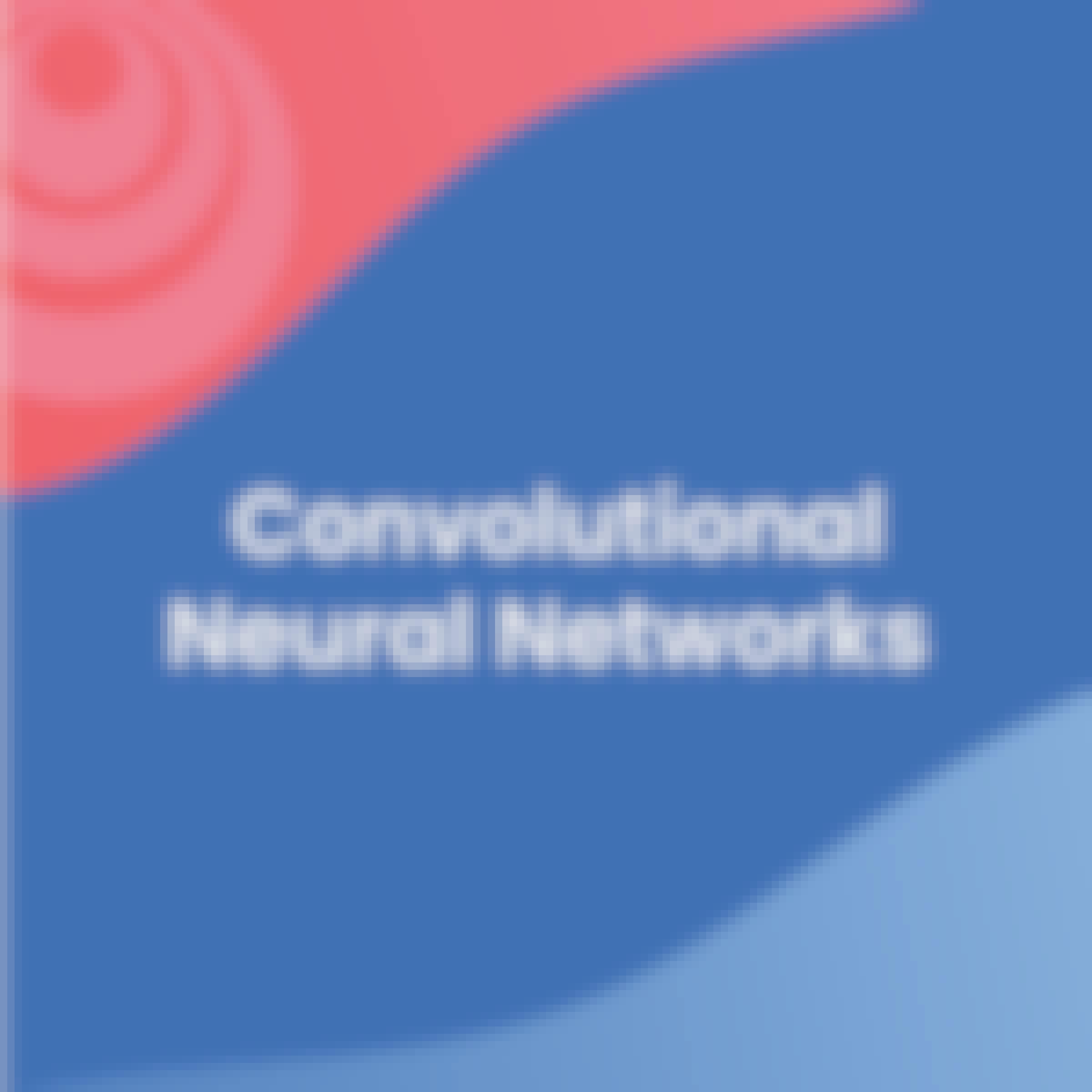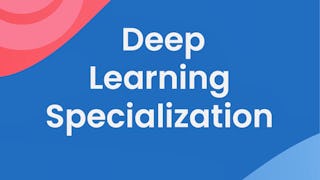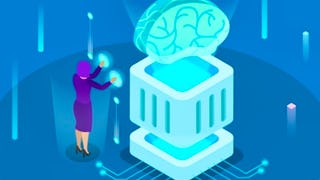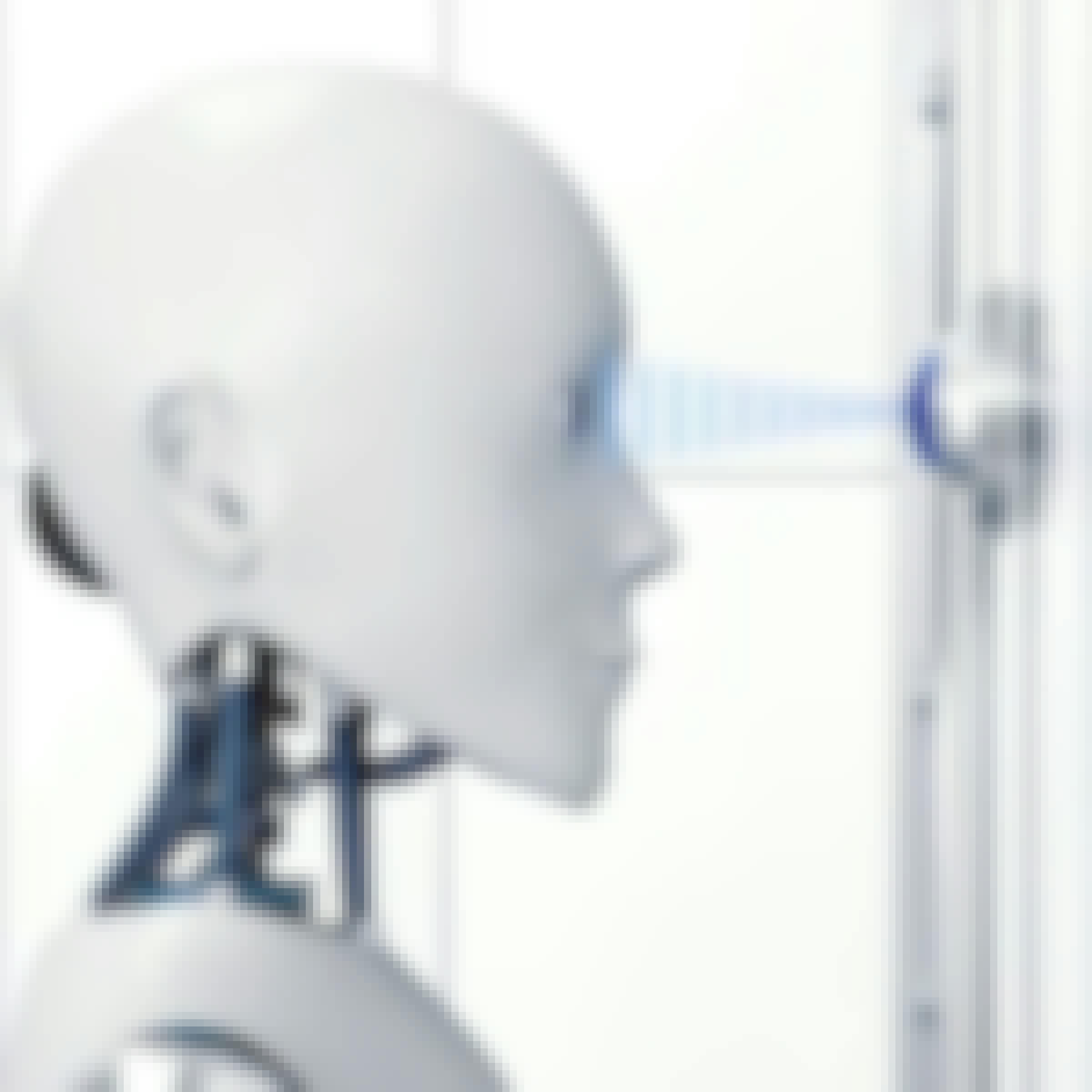Filter by
SubjectRequired
LanguageRequired
The language used throughout the course, in both instruction and assessments.
Learning ProductRequired
LevelRequired
DurationRequired
SkillsRequired
SubtitlesRequired
EducatorRequired
Explore the Convolutional Neural Network Course Catalog
 Status: Free Trial
Status: Free TrialDeepLearning.AI
Skills you'll gain: Computer Vision, Image Analysis, Keras (Neural Network Library), Artificial Neural Networks, Deep Learning, Tensorflow, Artificial Intelligence and Machine Learning (AI/ML), Applied Machine Learning, Machine Learning Methods, Data Processing, Algorithms
 Status: Free Trial
Status: Free TrialDeepLearning.AI
Skills you'll gain: Computer Vision, Image Analysis, Tensorflow, Deep Learning, Artificial Neural Networks, Natural Language Processing, Keras (Neural Network Library), Data-Driven Decision-Making, Large Language Modeling, Technical Management, Applied Machine Learning, Machine Learning, Debugging, Supervised Learning, Performance Tuning, Artificial Intelligence and Machine Learning (AI/ML), Machine Learning Methods, PyTorch (Machine Learning Library), Machine Learning Algorithms, Test Data
 Status: NewStatus: Free Trial
Status: NewStatus: Free TrialSkills you'll gain: Generative AI, Deep Learning, Tensorflow, Image Analysis, Artificial Neural Networks, Applied Machine Learning, Unsupervised Learning, Dimensionality Reduction, Data Synthesis
 Status: Free Trial
Status: Free TrialJohns Hopkins University
Skills you'll gain: Reinforcement Learning, Machine Learning Algorithms, Data Ethics, Deep Learning, Generative AI, Artificial Neural Networks, Artificial Intelligence, Machine Learning, Application Deployment, Data Presentation, Artificial Intelligence and Machine Learning (AI/ML), Exploratory Data Analysis, Ethical Standards And Conduct, Unsupervised Learning, Bayesian Statistics, Computer Vision, MLOps (Machine Learning Operations), Applied Machine Learning, Markov Model, Network Architecture
 Status: Free Trial
Status: Free TrialSkills you'll gain: Prompt Engineering, Large Language Modeling, Unsupervised Learning, PyTorch (Machine Learning Library), Keras (Neural Network Library), Supervised Learning, Applied Machine Learning, Generative AI, Deep Learning, Natural Language Processing, Reinforcement Learning, Scikit Learn (Machine Learning Library), Regression Analysis, Generative AI Agents, Artificial Neural Networks, Machine Learning Algorithms, ChatGPT, Machine Learning, Python Programming, Data Science

Skills you'll gain: Computer Vision, Image Analysis, Artificial Intelligence and Machine Learning (AI/ML), Cloud Applications, Artificial Neural Networks, Applied Machine Learning, Keras (Neural Network Library), PyTorch (Machine Learning Library), Deep Learning, Visualization (Computer Graphics), Machine Learning Algorithms, Tensorflow, Supervised Learning, Data Processing, Computer Programming, Application Deployment, Verification And Validation, Algorithms
What brings you to Coursera today?
 Status: NewStatus: Free Trial
Status: NewStatus: Free TrialSkills you'll gain: Data Visualization, Prompt Engineering, Data Presentation, Graphing, ChatGPT, Generative AI Agents, Generative AI, AI Personalization, Spreadsheet Software, Concision, Artificial Intelligence, Ideation, Report Writing, Business Correspondence, Complex Problem Solving, Document Management, Solution Design, Critical Thinking, Human Centered Design, Machine Learning
 Status: Free Trial
Status: Free TrialGoogle Cloud
Skills you'll gain: Prompt Engineering, Cloud Infrastructure, Kubernetes, Google Cloud Platform, Generative AI, Cloud Applications, Containerization, Identity and Access Management, Cloud Services, Cloud Computing, Virtual Machines, Cloud Storage, Network Infrastructure, Application Deployment, Data Storage Technologies, Serverless Computing, Scalability
 Status: Free Trial
Status: Free TrialSkills you'll gain: Generative AI Agents, Generative AI, OpenAI, ChatGPT, Business Process Automation, Natural Language Processing
 Status: Free Trial
Status: Free TrialSkills you'll gain: PyTorch (Machine Learning Library), Statistical Methods, Predictive Modeling, Tensorflow, Artificial Neural Networks, Probability & Statistics, Deep Learning, Classification And Regression Tree (CART), Regression Analysis, Data Manipulation, Data Structures
 Status: Free Trial
Status: Free TrialSkills you'll gain: Keras (Neural Network Library), Deep Learning, Artificial Neural Networks, Applied Machine Learning, Artificial Intelligence and Machine Learning (AI/ML), Unsupervised Learning, Machine Learning, Computer Vision, Natural Language Processing, Anomaly Detection, Image Analysis, Regression Analysis, Network Architecture
 Status: NewStatus: Free Trial
Status: NewStatus: Free TrialGoogle
Skills you'll gain: Prompt Engineering, Generative AI, Large Language Modeling, Artificial Intelligence and Machine Learning (AI/ML), Productivity Software, Workforce Development, Applied Machine Learning, Business Solutions, Organizational Strategy, Business Process Automation, Social Studies, Innovation, Data Collection, Automation, Data Security, Human Machine Interfaces, Forecasting, Emerging Technologies, Analysis, Critical Thinking
Convolutional Neural Network learners also search
In summary, here are 10 of our most popular convolutional neural network courses
- Convolutional Neural Networks: DeepLearning.AI
- Deep Learning: DeepLearning.AI
- Introduction Course to Autoencoders, VAEs, and GANs: Simplilearn
- Foundations of Neural Networks: Johns Hopkins University
- IBM AI Engineering: IBM
- Introduction to Computer Vision and Image Processing: IBM
- Google Prompting Essentials: Google
- Google Cloud Fundamentals: Core Infrastructure: Google Cloud
- Introduction to Artificial Intelligence (AI): IBM
- Introduction to Neural Networks and PyTorch: IBM










